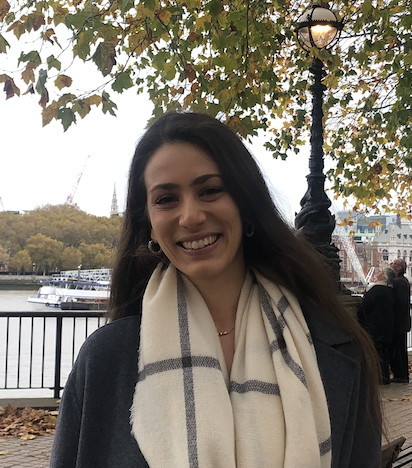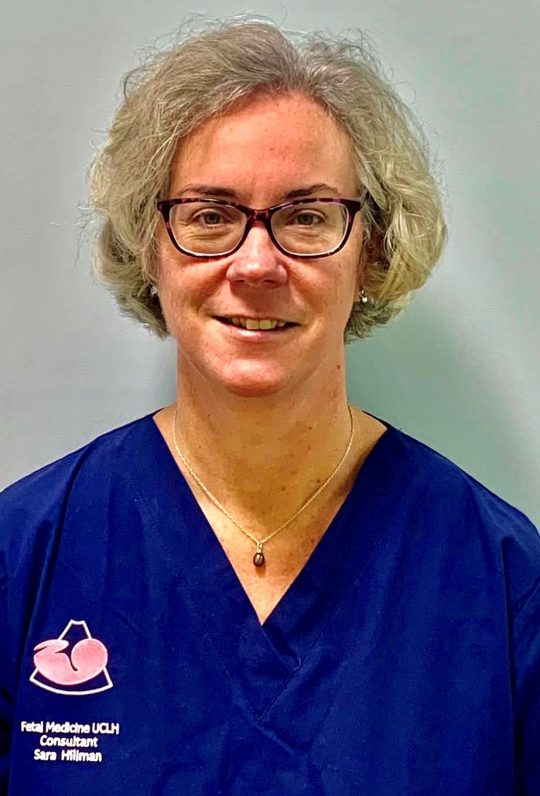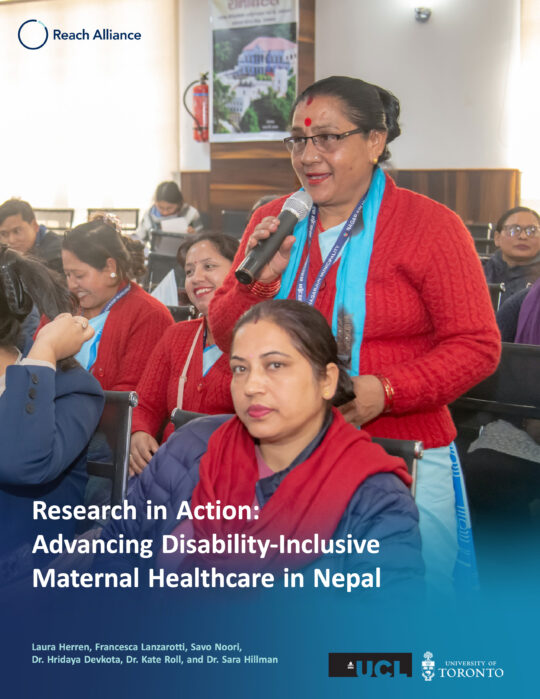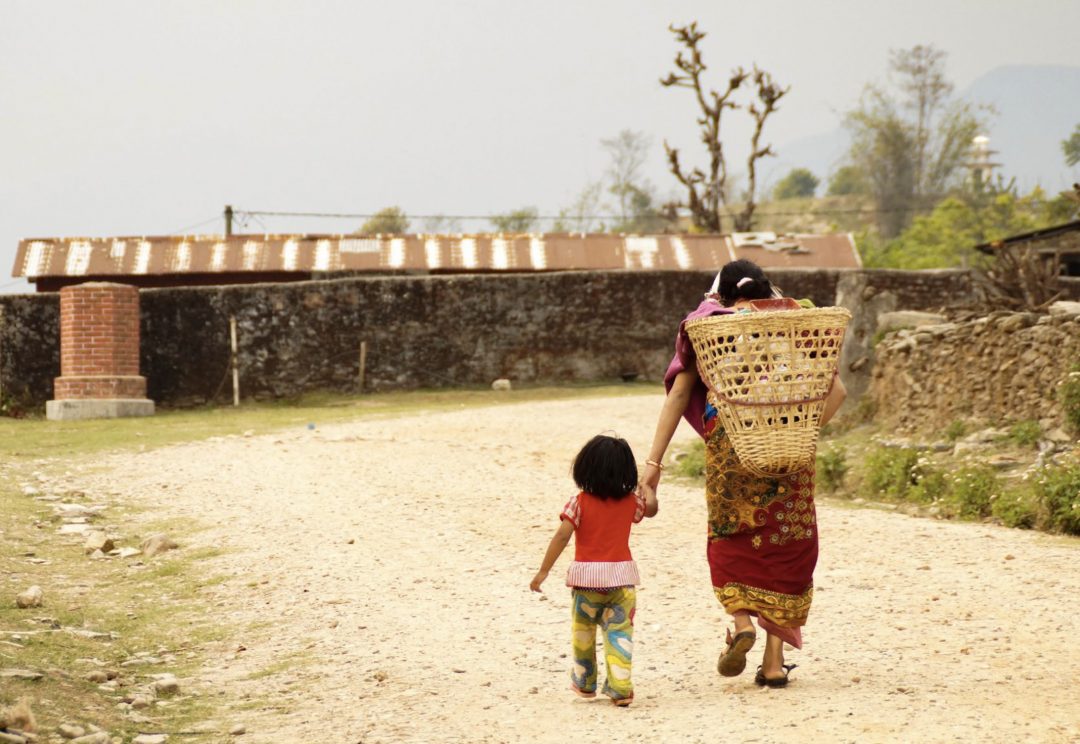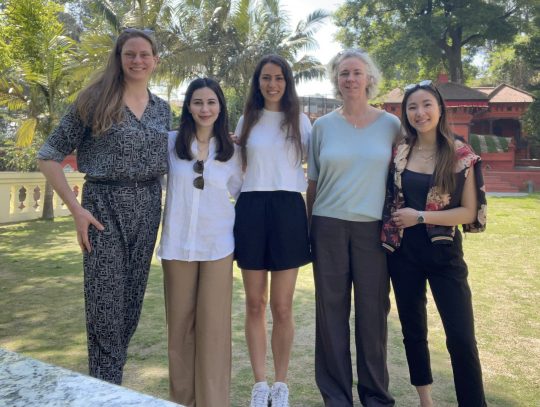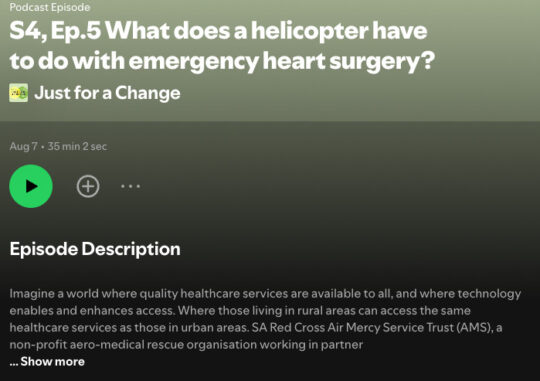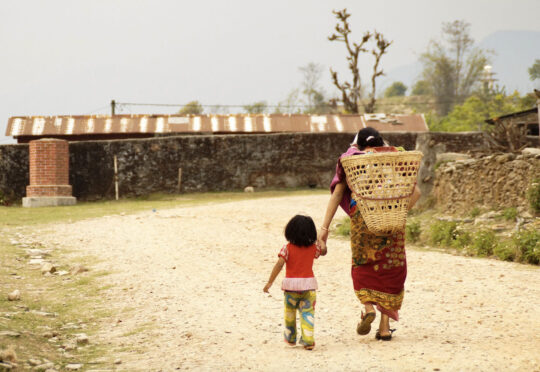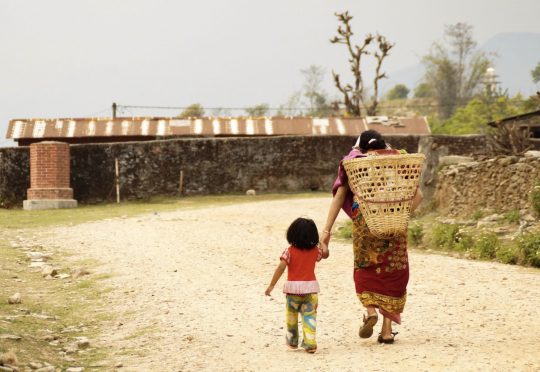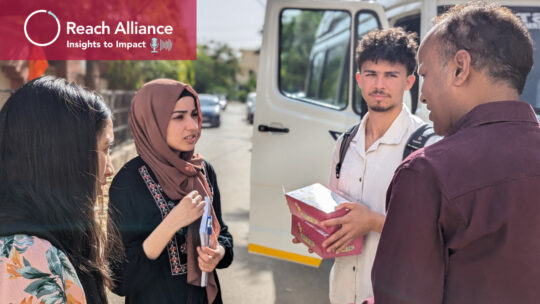Executive Summary
Despite national policies in Nepal and international guidelines, the rights of women with disabilities — especially the right to maternal healthcare before, during, and after pregnancy — are not realized. This is partially the result of multiple discriminations that women with disabilities face based on their disability and their gender. Such discrimination silences their voices and marginalizes their experiences, implicating their access to and quality of maternal healthcare. Their maternal healthcare is mainly affected by social and environmental barriers, a lack of specialized healthcare services, and gaps in disability policy. These challenges increase the risk of neglect, nonconsensual care, and obstetric violence which makes the discrimination an urgent issue to address.
We explored and identified barriers to access and quality of maternal healthcare for disabled women in Nepal. After a detailed literature review, we carried out five weeks of field work during April 2023 in two of Kathmandu’s municipalities. We worked closely with a Nepali research team to conduct in-depth semi-structured interviews with 12 women with disabilities, 12 policymakers, and 7 healthcare providers. We also organized three focus group discussions with female community healthcare volunteers and mothers who did not have disabilities.
We found that the main barrier to accessing maternal healthcare was the lack of infrastructure and financing, while the main barriers to the quality of healthcare were ineffective policy implementation and a lack of specialized training. We also identified different perspectives between the women and other participant groups — a distinction between the women’s real lived experiences and others’ presumptions.
While this research is specific to Kathmandu, it paves the way for recommendations and national policy implementations, as well as future research within the field of disabilities. This report also provides a platform for the women to share their stories and amplify their voices.
Context: Women with Disabilities Living in Nepal
In 2006, Nepal was the 86th country to sign the United Nations Convention on the Rights of Persons with Disabilities (UNCRPD), which defines disability as “the interaction between persons with impairments and attitudinal and environmental barriers that hinders their full and effective participation in society on an equal basis with others.” By signing this convention, the government recognizes the rights-based model of disability, which stipulates that people with disabilities have the same rights as everyone else in society, including access to quality healthcare. In the entire country, 2.2 per cent of the population has a disability.1 2
Although Nepal has signed the UNCRPD, it has not been able to fully carry out its commitment to ensure these rights. The United Nations Population Fund (UNPFA) has found that healthcare access for women with disabilities is low in the country because all women are subject to multiple forms of discrimination. Specifically, women there already suffer from having limited legal and political rights. They’re subject to gender-based violence and have limited access to economic resources.3
Despite recent efforts and slight improvements in Nepal’s promotion of maternal healthcare, more focused interventions targeting marginalized populations are needed. Women with disabilities are disproportionately disadvantaged when it comes to their access and quality of maternal healthcare, namely as a result of: (1) social barriers, (2) environmental barriers, (3) lack of specialized healthcare services, and (4) gaps in disability policy.
Social Barriers
Social beliefs have a significant impact on women with disabilities’ access and quality of maternal healthcare. Societal perceptions of the women are based on cultural beliefs that disability is a manifestation of karma resulting from sin in one’s prior life. Individuals with disabilities are seen as bad luck and often dismissed from the traditional gender roles of mothers. There are also negative stereotypes regarding how disability affects pregnancy — that it limits one’s ability to be a mother and care for a child. This specific stereotype is based on the belief that women with disabilities are already burdens to their families since they are assumed to lack independence. Some beliefs are also based on false information including concerns that the woman will pass on her impairment to her child. These societal beliefs may stigmatize the women and dissuade them from having children, despite Nepali cultural norms to have a child soon after marriage.
Given common assumptions that women with disabilities have less sex, families and communities may presume that they do not need maternal healthcare, thus directly affecting their access. However, some recent research suggests that families also demonstrated positive and attentive attitudes.4
Environmental Barriers
Nepali women face environmental obstacles in accessing and navigating healthcare facilities. The country’s topography makes physically reaching the healthcare facilities difficult. Many women have to travel extensive distances for long periods of time to reach the closest facility. These experiences are worsened by the poor quality of roads and transport networks within the country. Despite public transport being available, it is costly and not disability friendly. The need for support from family or friends during their journey increases financial burdens and limits when women visit the facilities depending on their companions’ availability. When they arrive at a healthcare facility, the environment and infrastructure there create further barriers for the women. Despite policies that outline the need for disability support, there is still a lack of reserved beds, sign-language interpreters, braille, ramps, and wheelchairs. Essentially, insufficient infrastructure makes accessing and navigating the facilities difficult and limits the services’ quality by not meeting the women’s unique needs.
Lack of Specialized Services
A lack of specialized healthcare services affects the quality of healthcare that women with disabilities receive. Maternal health services (including prenatal, antenatal, delivery, and postpartum care) play a crucial role in ensuring the well-being of women and their communities, directly impacting maternal and infant morbidity and mortality rates. Women with disabilities face inadequate healthcare services with complaints ranging from shortages of personnel to a lack of proper communication skills.
Previous studies have shown that healthcare providers in Nepal hold negative attitudes toward women with disabilities. These attitudes create an unwelcoming environment that discourages these women from seeking care and intensify maternal health risks among this vulnerable population. This unwelcoming environment is further exaggerated in public hospitals compared to private ones. There is also a lack of training initiatives for healthcare workers to better understand and serve women with disabilities’ unique needs. This knowledge gap poses a significant obstacle to promoting institutional deliveries and improving overall care quality.
Despite the advancements made in maternal healthcare access in Nepal through initiatives such as the “Safe Motherhood Project” aimed at reducing maternal and neonatal morbidity and mortality, challenges persist in ensuring adequate maternal health services, particularly for women with disabilities. The country has attempted to mitigate these issues by launching programs such as the “Skilled Birth Attendant” training program, which focuses on enhancing nurses’ proficiency in delivering maternal healthcare.5
Gaps in Disability Policy
Existing policies are not designed to sufficiently meet the needs of persons with disabilities, neither in accessing nor receiving healthcare. Although Nepal recently (2018) updated its Act Relating to Rights of Persons with Disabilities (2074), it was designed with minimal participation from the intended beneficiaries. Their lack of participation limited the accuracy of their needs assessment and thereby diminished the policy’s effectiveness. The rights of persons with disabilities in complementary policies such as Nepal’s guidance relevant to the Water, Sanitation, and Hygiene (WASH) program are “almost nonexistent” and therefore do not adequately cover the additional care that persons with disabilities may need.6
Implementation of existing policies is weak. Although there is a national framework (the National Guidelines for Disability Inclusive Health Services, 2019 ), health institutions at different administrative levels have struggled to sufficiently implement the guidelines. One reason is the country’s recent federalization in 2015 which has led to a lack of clarity around responsibilities for providing healthcare. Another reason is a general lack of funding which has limited local governments’ abilities to build appropriate infrastructure and provide adequate disability training for healthcare providers. The effectiveness of implementation is also minimal because women are not made aware of their right to treatment under these policies —including the right to reduced costs or free access when receiving healthcare.
Given how the national agenda has failed to prioritize persons with disabilities, and coupled with societal factors such as social stigma, there have been minimal efforts to collect data on this population group. This lack of data makes it difficult for policymakers to assess their needs when designing future policies and amendments.
Challenges that Women with Disabilities Face in the Changing Healthcare Structures
There are population groups that are not sufficiently “reached” by international policies such as the United Nations Convention on the Rights of Persons with Disabilities (UNCRPD). Nepal has recently undergone large-scale decentralization of its healthcare system after the introduction of the new constitution in 2015. A qualitative study of women with disabilities in the context of the country’s changing healthcare structures contributes to a better understanding of the impact of societal perception and stigma, the lack of infrastructure, and the lack of policy prioritization. We provide a foundation for policymakers to identify potential intervention areas and a platform for the women to share their experiences and marginalized voices. We aimed to:
assess women with disabilities’ barriers to access and quality of maternal healthcare from the perspective of various participant groups;
identify the implementation gaps of disability policy;
provide policy recommendations to improve maternal healthcare access and quality; and
provide a platform for the women to share their experiences and marginalized voices.
Figure 1. Factors influencing maternal healthcare experiences of women with disabilities in Nepal.Hardest to Reach
In Nepal, women with disabilities face a multitude of discriminatory challenges, stemming from a combination of gender-based prejudice, disability stigma, and sociocultural norms. They are often rendered invisible and marginalized by deeply rooted patriarchal systems that undervalue women’s roles and contributions, perpetuating gender inequality. Traditional beliefs further stigmatize them, leading to their social exclusion. A lack of awareness and understanding about disability further fuels harmful stereotypes and discrimination.
Nepal’s geographical challenges aggravate these complex issues, creating barriers that hinder the women’s access to education, healthcare, and high-quality medical services. Consequently, reaching out to this vulnerable population becomes incredibly challenging. Our research aimed to bridge the gap and connect with these women but also involved interviewing healthcare providers, policymakers, and mothers without disabilities. By understanding the perspectives of those directly involved in providing care and support, as well as individuals who may not face the same obstacles as women with disabilities, we sought to capture a comprehensive understanding of the experiences faced by this hard-to-reach population.
Figure 2. Research teams collaboratively designing and finalizing interview guides.Our Approach
Alongside a local research team, we conducted in-person, semi-structured interviews (SSI) and focus group discussions (FGD) during five weeks of fieldwork in Kathmandu. Prior to starting, the project received ethical approval from the University College London (UCL) Research Ethics Committee and the Nepal Health Research Council. In preparation for our field research, we conducted an in-depth literature review and developed an interview guide for each of our participant groups based on our key objectives. Experts in the field of disability research reviewed the interview guide to ensure its construct validity and cultural appropriateness.
When we arrived in Nepal, we met with Dr. Hridaya Devkota, an expert in qualitative research on women with disabilities. He put together and led a team of two Nepali female researchers with prior experience in healthcare studies to assist with the interview design, as well as recruiting and interviewing participants. It was paramount to work collaboratively to ensure our research was sensitive regarding the local culture and disability discourse. They contributed valuable insights into the current medical system and how recent decentralization had affected healthcare policy implementation.
During our first week in the field, we recruited participants from the two chosen municipalitiess surrounding Kathmandu, including Nagarjun, Dakshinkali, Kirtipur, Bhaktapur, Ramkot, and Basantapur. The range of locations ensured a diversity of individuals’ experiences. We recruited participants through key informants, opportunity sampling, and snowball sampling. Women were also recruited through government lists from Dhakshinkali and Nagarjun. They were included if they were aged 18 or over, if they had been pregnant in the last five years, and if they belonged to one of the following six of the seven disability categories recognized in Nepal: “physical disability,” “disability related to vision,” “disability related to hearing,” “deaf blind,” “disability related to voice and speech,” or “multiple disability.”7
We conducted in-depth SSI with our final sample of 12 women with physical or visual disabilities of different severity who had varied levels of education, socioeconomic status, and castes. Additionally, we conducted supplementary SSI with seven healthcare providers (including doctors, nurses, and midwives) and 12 policymakers (including deputy mayors, ministry leaders, and representatives from organizations for persons with disabilities [OPD]. See Table 1). SSIs, a standard method used in qualitative research, enabled us to gather rich and detailed data through discussions driven by the participants.8
Figure 3. Group of female community healthcare volunteers included in the study with two of the UCL researchers.Table 1. Summary of study participants.Once the participant recruitment was complete, we began field research. To mitigate power imbalances between researchers and participants, the local team conducted most of the interviews in the local language. The two female Nepali-speaking field researchers conducted the interviews which allowed participants to feel comfortable and share openly. As required by the Nepali ethics council, a small financial incentive was given to the women. We conducted only three interviews with English-speaking healthcare providers and observed three with the women with disabilities. The local researchers conducted the rest. We also had in-depth debriefs with the local team after each interview which enabled us to make iterative improvements to the project’s design.
Before each interview, we provided participants with an information sheet outlining the project’s aims as well as a consent form. We obtained their consent by reading aloud a consent form outlining confidentiality, anonymity, and the ability to withdraw, which participants signed with their signature or thumbprint (if they were illiterate). All interviews and FGDs were conducted in private locations that were accessible and convenient for the participants, especially those with disabilities. All interviews and FGDs were audio recorded with their consent to enable verbatim transcription and English translation at a later stage. Participants were each assigned a pseudonym composed of a letter and number to ensure that their data remained anonymous. The transcripts were coded with a thematic analysis framework to determine major patterns across the data. Several transcripts were double coded within the multidisciplinary team to ensure intercoder reliability, and the final themes were discussed with the Nepali researchers to address any potential biases.
Figure 4. A woman with a disability related to vision consenting to the interview (photo by UCL team 2023).Women’s Voices: Experiences and Insights
The interviews and focus group discussions (FGDs) produced vast amounts of data that we organized into main themes with corresponding subthemes: social barriers, environmental barriers, healthcare services, and policies (Table 2).
Table 2. Summary of themes and corresponding subthemes.Social Barriers
Family and community support
The majority of women described receiving positive attitudes, emotional support, practical support, and motivation during their pregnancy journey. One woman described the joyful reaction of her family: “They were very much happy. My daddy was crying while I was giving birth to a baby boy. The husband also becomes so happy” (W6). Both women and female community healthcare volunteers (FCHVs) explained that support from their husbands was especially important in improving their pregnancy experiences. While some women described negative second-hand experiences of abuse — “in some cases with intellectual disabilities, their parents throw out the uterus [hysterectomy] without their permission, and use contraceptives” (W7) — these treatments were anomalies. One woman with a severe physical disability described ambivalent reactions from her family.9
Contrary to the women’s accounts, policymakers and healthcare providers believed that families were unsupportive of the women’s pregnancies. One nurse described witnessing this first-hand: “I took care of many women with disabilities, so I knew that when she gives birth to the child, her family don’t take care of her” (H7). This nurse had been working for over 30 years, so she may have been referring to experiences in the past. A gynecologist further speculated that these perceived negative attitudes were caused by social stigma that affected the women’s abilities to access healthcare: “maybe the family doesn’t want them [society] to see. Let’s say family B has a woman who is disabled … [she is] not brought up to the hospital because of social stigma” (H4).
The mothers in the FGD believed families held these negative attitudes about women with disabilities in general, not just about their pregnancies: “Even the family member said that it would be better to die than to live in pain” (FGD mother). They believed that these negative attitudes were held beyond families within broader society. One provider described discriminatory and exclusionary behaviours: “They don’t say directly but indirectly they discriminate against people with disabilities … In any cultural programs such as holy songs in temples, if people with disabilities participate then they are treated with discrimination” (H6). Nevertheless, the FCHVs acknowledged that community attitudes had improved recently, especially regarding the use of appropriate and respectful language.
Stereotypes about women with disabilities
Healthcare providers and policymakers described a commonly held stereotype that women with disabilities lacked independence and were unable to take care of themselves. They believed that this implicated women’s access to healthcare: “So in the case of disabled women, it is more difficult. She needs to seek support from others to reach the health facility” (P6). This stereotype also influenced healthcare providers’ beliefs regarding women’s reproductive rights: “if she is not even able to care [for] herself, I think she does not possess that right to have a baby and to be under such … stress” (H3).
Although some FCHVs and community members thought the women also believed this stereotype, this was not the case according to the women themselves. Some — especially those with higher education — shared how they overcame these stereotypes through self-advocacy for their reproductive rights. “One thing is that in our society, people with disabilities get married. They also have rights — they can have children. They also have desire because they can have the desire like people without disabilities” (W7).
Another stereotype that the majority of participants held was that women with disabilities would pass on their disabilities to their children. The women themselves believed this stereotype, leading to doubts and worries: “Sometimes I thought that either my baby will also born disabled like me or not” (W1). Healthcare providers also described having to reassure women about whether their child would have a disability. While one doctor claimed “Being a medical professional, I don’t actually believe in those taboos or misconceptions that society has about disabled women” (H2), the FCHVs shared that many doctors do believe this stereotype and assume that the child will need more treatment. Finally, during the FGDs, the mothers and FCHVs shared the stereotype that “in society, the people said that this [disability was] the sin of previous life” (FGD mother). However, neither women, healthcare providers, nor policymakers referenced this stereotype that the mothers and FCHVs held.
Environmental Barriers
Women’s Experiences Reaching Facilities
There was general consensus among participants regarding women’s difficulties in accessing healthcare facilities. Multiple women reported having to travel long distances: “It’s about one-and-a-half hours to reach there [facility] from Sitapaila” (W10). One healthcare provider described how these distances were one of the reasons that women may not attend check-ups. A few women accessed the facilities on foot but found it “difficult” (W4) and a “struggle” (W1) given the road conditions. Most women used buses instead, which also presented difficulties such as inaccessible steps and people not offering them seats. Although most women were aware of their entitlement to transport discounts, healthcare providers suggested that using buses may still create extra costs. The financial burden was amplified if they used private cars or taxis, which women claimed were very expensive.
The only positive aspect of their pregnancy journey that the women described was the support from family, friends, or FCHVs who accompanied them: “If there is someone alongside it will be easier … it would have been risky to move alone, boarding in public bus — buses don’t reach to hospitals. We have to walk. Walking on roads with ditches — we can trip and fall anywhere” (W5). By contrast, one healthcare provider suggested that women do not attend regularly “because their family members did not take them to a health facility” (H5), highlighting the importance of support. Only a minority of women reported that their husbands were unable to accompany them because of work commitments. However, one policymaker described how, “if it is not possible to make that kind of passage or wheelchair accessible passage, the health workers will go to them and check their health” (P2), so adaptations were offered.
Figure 5. Health post in Dakshinkali where focus group discussions with female community healthcare volunteers took place (photo by UCL team 2023).Women’s Experiences Within Facilities
A majority of interviewees agreed that infra-structure in healthcare facilities was insufficient for women with disabilities. Policymakers noted that “the facilities provided to disabled people are not enough” (P6) — there are rarely any ramps or disability-friendly toilets, or wheelchair availability. Similarly, women with disabilities also believed that infrastructure was lacking: “When I used to visit … hospitals … the structure [and] beds were not disabled friendly” (W11), and others added that there was a lack of braille signs or sign-language interpreters. Multiple women described how the stairs limited their access: “There was also provision of elevator but not all rooms are accessible by elevator” (W9). While infrastructure was especially limited in older buildings that could not be renovated, three policymakers suggested that improvements are occurring in newer buildings: “We have also made disability-friendly infrastructure in newly made building at the ward level” (P7). This was supported by a healthcare provider who thought “they [policymakers] are trying their best to make sure it’s a disability-friendly institution” (H4), confirming the positive changes.
Healthcare Services
Quality of Providers’ Communication
During their pregnancies, the participants had varying communication experiences with their healthcare providers. Around half of them appreciated the providers’ responsiveness, openness to questions, and informative communication. One put it this way: “They gave me enough time. And they also made me comfortable to ask the things that I wanted to know. I like it” (W1). Others reported unsatisfactory interactions, mentioning inadequate communication and insufficient explanations of diagnostic reports: “I wish she told me more about the condition of my pregnancy, and the things I should and not do. She only said that everything is normal … take medicine” (W6). Healthcare providers recognized communication challenges when interacting with women with disabilities, often relying on companions or family members for communication. Only one provider used sign language for auditory and speech impairments, along with visual aids for clarity: “In some cases, they cannot be understood by writing. So, in that case, we show them pictorial materials like charts” (H5). Similarly, one FCHV group used charts to facilitate communication.
Figure 7. Summary of findings and recommendations.Autonomy During Pregnancy Experience
When it comes to autonomy in making decisions about their pregnancy and childbirth preferences, approximately half of the women made independent decisions and choices. The remaining half engaged in discussions with their families and husbands, leading to joint decisions: “I make the decision myself. My husband agrees with my decision” (W3). In both scenarios, the women’s voices and preferences were considered. This level of autonomy could potentially stem from the fact that nine women possessed some educational background, and seven had professional experiences. These factors may have empowered them with a heightened sense of independence and self-expression. In contrast, the majority of healthcare providers and FCHVs believed that the women often had limited control over their own decisions. They claimed that in such cases, husbands and parents-in-law often took charge of decision making instead of allowing women to make choices independently: “The decision is taken by family members, not by the women” (FCHV Ramkot). Some providers recognized that this lack of autonomy is not unique to women with disabilities but is a widespread issue that women across the country face.
Healthcare Providers’ Disability Training
Healthcare providers recognized a significant gap in their training when it came to specialized maternal care for women with disabilities — a problem they believed was rooted in the inadequacies of both the educational curriculum and later medical training. They emphasized the need for tailored instructions encompassing consultation, communication, and management techniques, with a particular call for specialized FCHV training: “People with disabilities need specialized care and if we counsel the patient in a way we do without disabilities, their needs might not be met” (H2). Complementing these sentiments, the FCHVs themselves also expressed a need for more precise training: “We don’t know how to deal with different category of disabled people. The training is fruitful if provided on this topic” (FCHV Ramkot). They made proposals for an orientation program specifically for staff nurses and auxiliary nurse midwives.
Healthcare Providers’ Attitudes
Women with disabilities encountered diverse attitudes from healthcare providers depending on the hospital and the individual providers they interacted with. Approximately half of the women with disabilities had positive encounters with reassuring and respectful healthcare providers. They felt well treated, particularly when they disclosed their disabilities and advocated for themselves: “Now I have told about my problems with doctors so they treat me nicely” (W7). Others encountered less favourable attitudes, particularly in government hospitals where providers were often task-focused and rude: “They scolded me a little during the time of delivery while I was having difficulty” (W12). This drove some to seek care in private hospitals. A healthcare provider and a policymaker both acknowledged the existence of such behaviours in government hospitals.
Regarding reproductive rights, most healthcare providers believe women with disabilities should have equal treatment and the same choices as women without disabilities: “That is totally a woman’s right. If she wants to conceive she can, but in case of severe diseases we can just suggest them or guide them” (H1). However, some providers claimed they may advise against pregnancy if it posed health risks to the woman or the baby.
Policies
Disability Policy Implementation
Participants had mixed responses to the quality of policy implementation for people with disabilities. For policymakers, “implementation” meant having disability-friendly infrastructure and providing financial allowance rather than providing disability-friendly services: “There is provision of lift, ramp, big screen outside the building, everything is accessible” (OPD1). Similarly, women with disabilities perceived policy implementation to be financial benefits rather than the standards of healthcare that the policy sets forth: “I had shown the disability card to them so that I did not stay in line and I also received many discounts” (W10). Healthcare providers considered implementation in the context of health service quality: “I’m personally responsible to categorize any woman or any person with disabilities into different categories” (H2), rather than financial benefits or infrastructure.
There were a handful of positive responses to the quality of “implementation” such as “I think yes, the policies are being implemented pretty nicely these days” (H2). However, a majority of the participants recognized that “there are many policies regarding rights of disabilities but lack effective implementation” (OPD2). Specifically, participants outlined four issues creating implementation gaps:
Disability policies are “not a priority of political leaders” (P6) at both national and local levels.
“There is no proper coordination between the three level of government and … between the [ministries]” (OPD1).
There is a lack of knowledge on the rights of people with disabilities by those who should be implementing them.
There is a lack of financing to build adequate infrastructure and ensure proper healthcare training: “All the complete resources are not sent from the upper level” (P1).
Policymakers and women with disabilities mostly told us that the implementation gap arises from a lack of quality of treatment they received from healthcare providers, which they claim is caused by the lack of training. Healthcare providers primarily mentioned a lack of infrastructure for people with disabilities in healthcare institutions to be the biggest implementation gap.
Participation in Policy Formation
There were varying levels of participation in the policymaking process. One policymaker was directly involved in the policy’s amendment and told us “I participated in the amendment process of this guideline” (P6). Other OPDs were involved in advocacy groups to push for improved policies for women with disabilities: “We organizations do advocacy for formulating, making, and implementing policies” (OPD2). Among the women, only two participated directly. One was asked by the government to participate by representing a type of disability: “I met [policymakers] and talked about the structure in [the hospitals]” (W7). The second was involved in policy amendments: “[Women with disabilities] also participate … That’s why we sit and discuss with the committee that has disabled people as well” (P8). Similarly, FCHVs did not mention participating in the policy process, and healthcare providers noted that they had no power to influence policies because they “are staying under the political parties … and cannot make decisions ourselves” (H5). Thus, women with disabilities’ and healthcare providers’ lack of participation in policymaking remains an issue.
The Cost and Funding of Healthcare
Overall, all interviewees were highly informed about costs and finances. They identified two issues with the finances for people with disabilities: (1) “We don’t have enough budget to build infrastructure, offer adequate training for healthcare providers, or make health services cheaper for women with disabilities” (OPD1) and (2) low prioritization of people with disabilities: “The political leaders did not take the issues of disability seriously, so there are only a few budgets allocated to this sector” (P5). Policymakers mostly mentioned that the money is inadequate to build infrastructure in healthcare institutions, with one interesting exception: P5 argued that the funds are there but that the problem is weak implementation.
Policymakers also reported that the federalization of the healthcare system benefited persons with disabilities because the budget is now disbursed locally by policymakers who know the context and needs of women with disabilities: “We have the benefit that they all allocate budget from local level … the local government know[s] the needs and problems of disabled people in that area” (OPD1). Healthcare providers reported that there was not enough budget for training or sufficient infrastructure. Generally, women with disabilities reported that healthcare services were moderately expensive for anyone receiving disability benefits.
Areas for Improvement
One recurring suggestion for improvement was that disability training should be included “in the training curriculum” (P9). One policymaker felt that there should be more focus on quality of healthcare services rather than simply on the availability of healthcare services: “Until now we have worked on access, we have worked on availability, but we still have to work on quality” (P9). In order to do this, policymakers emphasized increasing the participation of women with disabilities in the policymaking process by hiring “expert[s] related to this field” (OPD1). The women emphasized the need for infrastructure within the healthcare facility as well as ensuring the participation of people with a range of disabilities in the policymaking process to make sure that the needs of all people with disabilities are met: “instead of focusing on just one, I think that if we go to all of them [women with disabilities], we can understand the experiences of everyone” (W7). An interesting suggestion was for the government to make sure that there is disability-friendly infrastructure in private homes, not just healthcare institutions. FCHVs suggested improving data collection on people with disabilities.
Findings: Perception Differences, Barriers, and Quality of Care
Different stakeholders see things differently, leading to misunderstandings about family support, women’s autonomy, policy implementation, and reproductive rights. We also learned that two fundamental barriers to access persist: a lack of adequate physical infrastructure outside and within healthcare facilities, and insufficient funding. We also discovered that the quality of care is compromised as a result of inadequate provider training and ineffective policy implementation. These insights underline the necessity of aligning perceptions, enhancing infrastructure, prioritizing funding allocation specifically tailored to disabilities, and establishing training programs to provide better healthcare services for women with disabilities.
Different Perceptions Between Stakeholders
Across many of the themes, healthcare providers and policymakers had different perceptions of women’s experiences and factors determining their access and quality of healthcare, which did not align with the women’s descriptions of their lived realities. While women described positive attitudes from their families, healthcare providers and policymakers assumed that families were unsupportive, both emotionally and practically. This may lead to wrongful assumptions about the women’s needs for access to healthcare. There were also distinctions regarding the women’s decision-making autonomy. The healthcare providers believed women had limited control and stereotyped them as lacking independence, which countered the women’s strong self-advocacy. The misalignment of expectations in autonomous decision making may cause providers to address the women’s families when making decisions rather than engaging with the women themselves, thus affecting the women’s quality of services.
There were different interpretations of “policy implementation.” Healthcare providers focused on the quality of services, whereas the women and policymakers focused on more concrete/tangible implementations such as finances and physical infrastructure. There were also vast differences between the women who advocated for their unequivocal and equal reproductive rights, and some healthcare providers who believed that women’s medical fitness should be considered despite their right to have a child. This difference, which was rooted in the stereotypes some providers had about the women, may have detrimental implications for the quality of and access to healthcare offered. Although women’s self-advocacy could be a factor in overcoming these barriers, the discrepancy on how they should embody their reproductive rights may still affect their healthcare.
Figure 7. Summary of findings and recommendations.Overall, the women’s more positive perspectives contradict previous research that found women reported receiving negative attitudes, experiencing less autonomy, and interpreted lacking implementation in a similar way to healthcare providers’ interpretation. While this may be a unique finding to this sample, it may also suggest improvements in healthcare access and quality based on recent initiatives and policy implementations. All these differences indicate that stakeholders may be removed from the women’s realities, a circumstance that is troublesome during policy creation. It illustrates the marginalization of the women’s voices. The different perceptions could also influence stakeholders’ prejudices and preconceptions, thereby misguiding the provision of services and affecting women’s access and quality.
Recommendation One
Given the vast differences in perceptions of the women’s experiences, the participants of the study should convene to encourage intergroup dialogue, conversation, and understanding. An initial interactive workshop could help establish communication between the various participant groups to create and drive meaningful change. Such a workshop would allow the women to share their own or second-hand experiences and healthcare needs. Women from various socioeconomic backgrounds and disabilities should be included to account for varied perspectives. Other participants would include healthcare providers and policymakers in a position of influence who could easily disseminate the information to their networks. Leaders of organizations for persons with disabilities (OPDs) and academic researchers within the disability field could attend and help mediate conversations to bridge the gap between the women and the stakeholders. The workshop would encourage discussions on how to integrate the women’s perspectives and needs into existing services and policies and address social misconceptions through improved communication between participant groups. Additionally, it would relieve the women’s self-advocacy burden and distribute the responsibility to all the stakeholders to ensure change is achieved. The workshop would have to be followed up with the creation of a committee to cultivate intergroup communication. Representatives from each of the participant groups would continuously work toward integrating the shared understanding into practice to ensure longer-term and systemic change, such as through greater inclusion of women in the policymaking process.
Key Barriers to Healthcare Access
The barriers to maternal healthcare access for women with disabilities remain stark and significant. This is especially the case with the lack of disability-friendly infrastructure and the lack of finances to build this infrastructure, even after the introduction of the reformed Act Relating to Rights of Persons with Disabilities (2074) in 2017. For example, the infrastructure outside of healthcare facilities such as road condition and the limited and unreliable public transportation services ultimately restricts women’s abilities to travel to the healthcare institutions. It also makes pregnant women with disabilities more reliant on their communities and families to reach healthcare facilities. This inhibits their access but also implicates their autonomy. Improved infrastructure could resolve the issue of limited access to healthcare and limited autonomy. It is also the lack of disability-friendly facilities within healthcare institutions that makes it difficult for women with disabilities to move around once they have reached healthcare facilities and receive adequate treatment. The stark recognition from both women and healthcare professionals indicates this problem’s degree of severity. Although policymakers have discussed improvements in the infrastructure in the newer healthcare facilities, such improvements are not reflected in the responses and experiences of the women with disabilities. Essentially, our findings support existing studies that call for improved infrastructure. Building physical infrastructure both outside and within healthcare institutions should continue to be one of the highest policy priorities.
Our findings suggest that the lack of infrastructure and high barriers to healthcare access are attributable to high costs. There are insufficient government funds to build physical infrastructure adapted to the needs of women with disabilities and to subsidize their healthcare costs. The lack of funding for disability-friendly infrastructure is not the result of a lack of overall government funds, but a lack of prioritizing the community with disabilities during the distribution of those funds. This may be a result of policymakers’ lack of exposure to the difficulties of the community with disabilities, which leads to a lack of awareness about the severity of these problems.
The issue must be at the forefront of the policy discussion by making policymakers and key stakeholders more aware of the issue’s importance. Essentially, when ensuring healthcare access in relation to The Act Relating to Rights of Persons with Disabilities (2074), there is much room for improvement in two areas: building disability-friendly infrastructure and ensuring greater financial commitment to improving maternal healthcare for women with disabilities.
Recommendation Two
To address the lack of sufficient disability-friendly infrastructure and finances, our recommendation is twofold. First, there should be an awareness campaign targeted toward policymakers to ensure they understand the disabled community’s needs. Combined with the previous workshop recommendation this would increase the likelihood of the disabled community being a priority for the distribution of funds.
Second, the government should foster stronger partnerships with nongovernmental organizations (NGOs) and development banks to leverage funds and carry out disability-oriented projects. NGOs such as the International Disability Alliance, Handicap International, and the International Committee of the Red Cross, as well as development banks such as the Asian Development Bank are currently sources of finance to support inclusive growth and development. They could be a potential source for leveraging funds specifically to build disability-related infrastructure.
Partnering with these institutions would also enable a more context-specific focus on improving access to maternal healthcare. It would also delegate some responsibility from the central government toward third-sector (nonprofit) parties and foster a more systematic partnership and cooperation between different actors in the field of disabilities, including but not limited to women with disabilities, female community healthcare volunteers (FCHVs), local policymakers, and international experts. These partnerships could also contribute to improved data on women with disabilities, including their location and their specific healthcare needs, because NGOs and development banks often have increased project capacity to focus on specific marginalized groups. Ultimately, these partnerships could also help disseminate the information on women with disabilities across all institutional levels to key stakeholders.
Key Barriers to Healthcare Quality
The two primary barriers to receiving quality care are inadequate training of healthcare providers and ineffective policy implementation. Both healthcare providers and the FCHVs described a lack of specialized training for delivering maternal healthcare to women with disabilities. This mirrors the findings of Morrison and colleagues, which underlines the scarcity of disability-specific training.10
Another significant barrier to ensuring healthcare quality stems from inadequate knowledge of disability policies among policymakers and healthcare providers, leading to an implementation gap. This indicates weak information dissemination across different levels of government regarding the maternal healthcare needs of women with disabilities. Policymakers’ limited awareness of policies suggests a delegation of responsibility to others by blaming local governments or institutional structures and placing the responsibility on providers and women themselves. This deferral of responsibilities can lead to inadequate distribution of resources and a lack of appropriate services, ultimately compromising the overall quality of care.
Recommendation Three
Based on the key quality barriers we identified, our final recommendation is to develop specialized training programs for healthcare providers. It could be integrated into current training programs and encompass a wide range of topics such as tailored medical care, healthcare management techniques, and respectful and effective communication that considers the unique needs of these women.
To address the communication issue, it would be valuable for providers — including the FCHVs — to learn how to effectively communicate with women who have different disabilities, such as those with hearing, visual, and speech difficulties. It is essential for them to be familiar with alternative communication methods such as the use of sign language interpreters and visual materials. In addition to practical skills, these training programs should incorporate a thorough understanding of disability policies. Being at the forefront of service delivery, healthcare providers should be knowledgeable about these policies to ensure their effective implementation. Such understanding will facilitate the provision of quality maternal healthcare services in line with the policies’ requirements and provisions.
A short training program for policymakers could also foster a profound understanding of these policies. This would enable better policy formulation, more targeted resource allocation, and stronger accountability in the implementation process, ultimately ensuring that the needs of women with disabilities are adequately addressed.
Lessons Learned
Reflecting on Our Approach
Throughout this project we all acknowledged the critical importance of working closely with the team of local researchers in Nepal. Not only did this allow us to understand some of the nuances in Nepali culture and ensure we used appropriate and relevant research methods, but it also aided with the logistics of the study (i.e., translation, interview scheduling, negotiating with local municipalities). Collaborating with Nepali researchers also allowed us to conduct this important research, without imposing Eurocentric ideologies onto a local context. Our partnership took steps toward decolonizing research within this field by not blindly applying methods that undermined local knowledge. Another important lesson was the importance of person-centric research by allowing participants, particularly the women, to lead the interviews and discussions. By placing the women at the centre of this project we were able to highlight, amplify, and provide a platform for their voices which had previously been marginalized.
Project Limitations
Given the limited time we had to conduct fieldwork, our participants were limited to the outskirts of Kathmandu. Our sample may have included more urbanized participants which could have influenced their perspectives. Other areas of Nepal might present different barriers to maternal healthcare, such as more severe environmental obstacles. Although our aim was not to generalize our findings to all Nepali districts, these conclusions reflect the reality of women with disabilities primarily in Kathmandu. The participants in our study were women who voluntarily chose to participate, potentially indicating a higher level of empowerment. To identify the barriers, further research should include women who wished to but were unable to become pregnant. Given a time-sensitive recruitment process, we could recruit only a small sample of women with physical and visual disabilities which may have limited our findings. As such, future research should be conducted beyond Kathmandu, and on women with auditory, speech, and intellectual disabilities. Given the challenges around multilingual research, the transcripts varied in quality so some details were lost in the translation processes though we took steps to mitigate this such as supervision of transcript translation. And despite all efforts, given the nature of cross-cultural research power imbalances between the researchers and participants may have still occurred. Providing the women with incentives to partake in the project may have further exacerbated the imbalance.
Conclusion
This research paves the way for similar studies in other contexts where women with disabilities have also been marginalized and to help explain the variation in their experiences. As one woman powerfully put it: “It is difficult for people with disabilities. We had to fight with society. Every moment, every step is to fight. Every time we had to face something” (W4). This research would become a potent force to amplify the women’s resilience in their ongoing fight.
Acknowledgments
We express our sincere gratitude to our mentors Dr. Kate Roll and Dr. Sara Hillman for their consistent support throughout this project. Their encouragement and advice in the design and execution of the research was crucial. We also thank Dr. Hridaya Devkota for his instrumental role in leading the recruitment process, the field research, and for being a source of support. A big thank you to Sapana Panta and Suyasha Adhikari for conducting the field research and for their contributions about culture in Nepal.
We are grateful to Naomi Saville and Maria Kett for their feedback and advice. We are also thankful for Laura Lemos who was an early contributor and inspired us to think critically about our research. Additionally, we thank Nicole Jolly for her guidance throughout this project. Finally, we thank all participants who agreed to take part in this study. We hope to amplify your voices with this report.
Note on language: Throughout this report, we use the words mothers and women to describe the participant groups because this is the standard language used in Nepal. We acknowledge that there may be individuals who do not align with the gender binary, and the experiences reflected in this research may be generalizable to them. Furthermore, any disability-related language in this paper is in line with Nepal’s official disability categorization outlined in its legislation called The Act Relating to Rights of Persons with Disabilities (2074).
MASTERCARD CENTER FOR INCLUSIVE GROWTH
The Center for Inclusive Growth advances equitable and sustainable economic growth and financial inclusion around the world. The Center leverages the company’s core assets and competencies, including data insights, expertise, and technology, while administering the philanthropic Mastercard Impact Fund, to produce independent research, scale global programs, and empower a community of thinkers, leaders, and doers on the front lines of inclusive growth.
MUNK SCHOOL OF GLOBAL AFFAIRS & PUBLIC POLICY
The Munk School of Global Affairs & Public Policy at the University of Toronto brings together passionate researchers, experts, and students to address the needs of a rapidly changing world. Through innovative teaching, collaborative research, and robust public dialogue and debate, we are shaping the next generation of leaders to tackle our most pressing global and domestic challenges.

